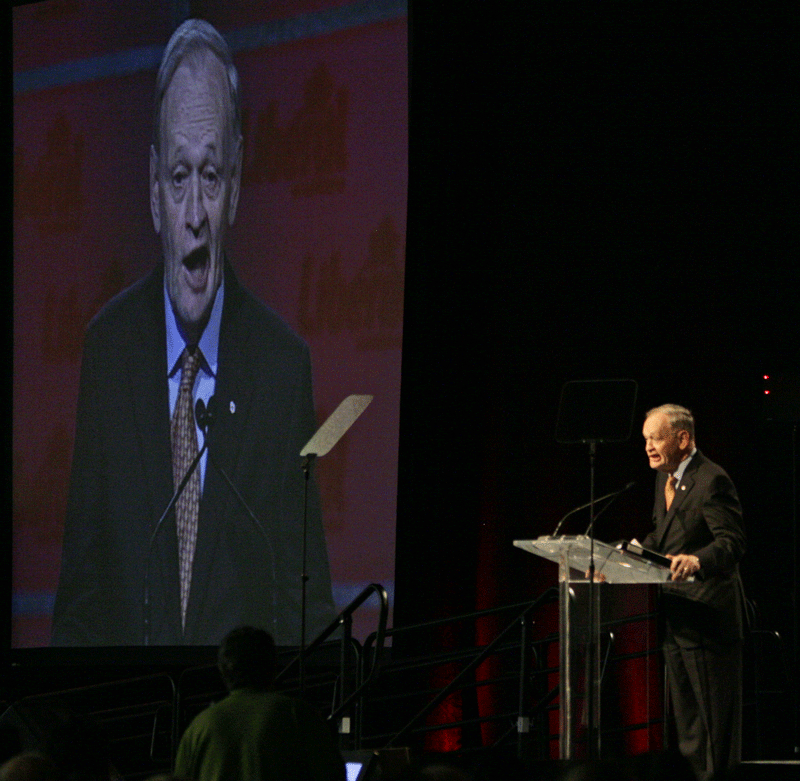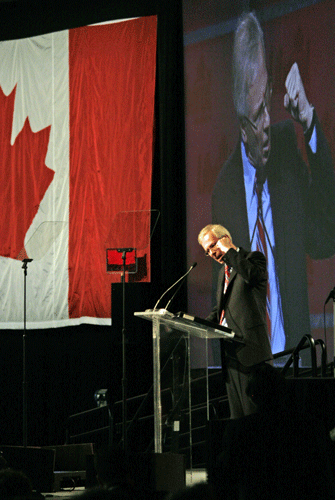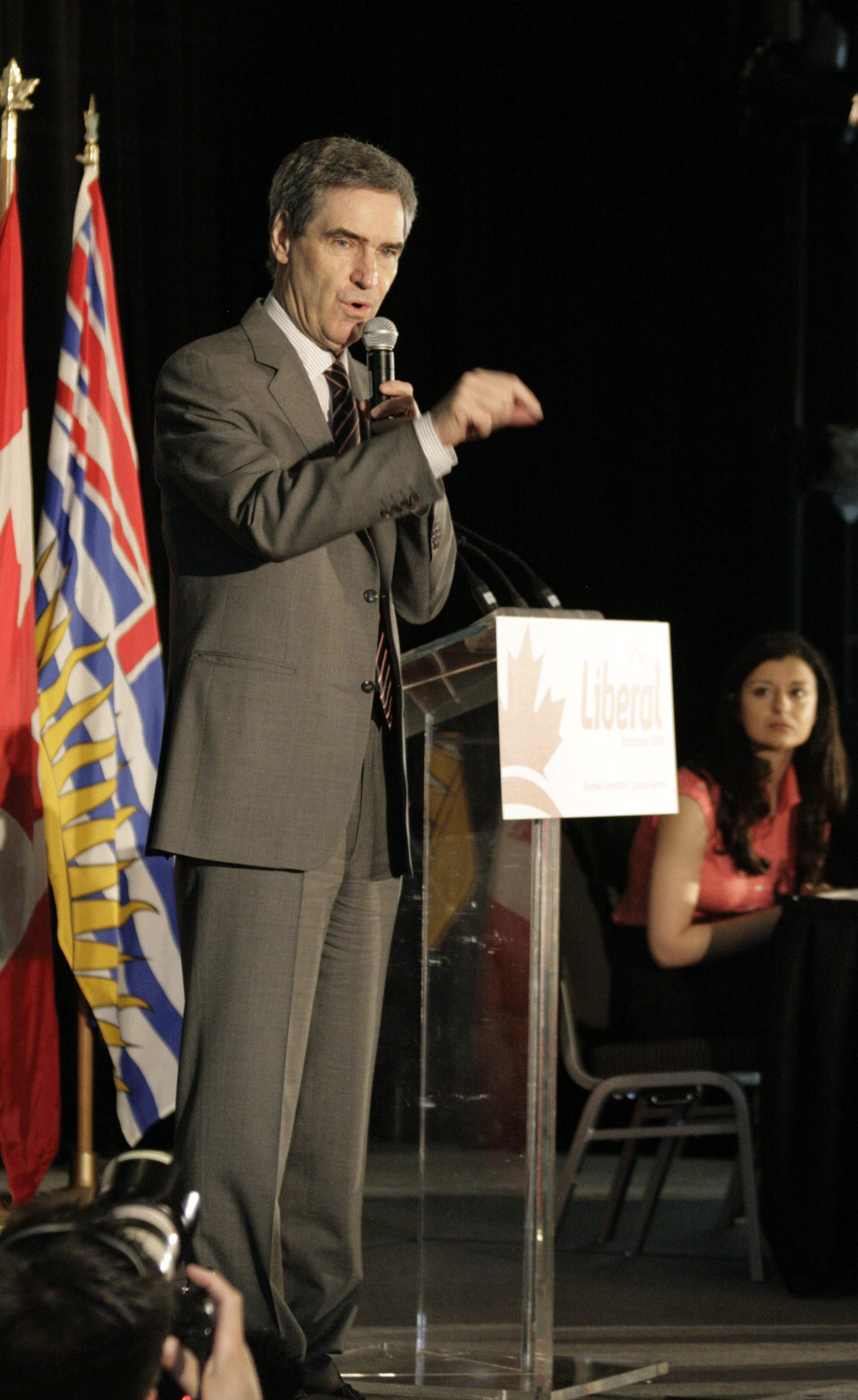Political Perspectives is produced by the students and faculty of Carleton University's School of Journalism and Communication, Canada's oldest journalism school.
14th
MAY 2009
What I missed
Posted by cwaddell under All, Media Commentary, Political Strategy
Christopher Waddell
Having been out of the country for a week where news about all the important political things happening in Canada is hard to find, here are a couple of observations.
Is there so little for the House of Commons to do that a committee really spent its time investigating the employer-employee relationship between an MP and caregivers hired to work for her family, including having the caregivers testify? I had thought Parliament couldn’t be more irrelevant than a committee investigating who should be the captain of Team Canada at the world hockey championships but I guess I was wrong. I’d hold off though for a while though on those stories about more and more people don’t vote and why it is so hard to persuade good people to give up interesting careers to enter politics to help improve public policy. The answer is a little too self-evident at the moment.
With the media staggered by a collapse in advertising due to the recession, why is so much media attention being devoted to the Conservatives launching an advertising campaign against Michael Ignatieff, including all the details of the campaign and the ads? Wouldn’t it be smarter and certainly more financially rewarding to force the Conservatives to buy ads?
Finally there is a very good review by Ron Graham of Ignatieff’s book True Patriot Love in the latest Literary Review of Canada. Although he has written widely on a range of subjects, to those in politics Graham is best known as the writer of Jean Chretien’s two books, Straight from the Heart and My Years as Prime Minister.
2nd
MAY 2009
Policy Substance
Posted by padams under All, Media Commentary, Political Strategy
Paul Adams
Further to Elly Alboim’s post yesterday in which he said that the Conservatives would try to feed into the media narrative that Michael Ignatieff has not said enough about policy, at the end of last night’s interminable farewell speech by Stéphane Dion, Stephen Harper’s communication aide, Dmitri Soudas, emailed reporters commenting that Dion had delivered more policy substance in his speech than Ignatieff had done in his four months as Liberal leader.
2nd
The long goodbye
Posted by padams under All, Media Commentary, Political Strategy
Paul Adams
Paul Adams is blogging the federal Liberal convention in Vancouver this weekend.
Last night’s tribute to Stéphane Dion began after 11:00 p.m. central time, presumably so that the majority of Canadians living east of Thunder Bay were unlikely even to stumble across it by accident.
A little earlier, Jean Chrétien had given a rollicking partisan speech, whose centre-piece was a riff on Stephen Harper’s absence from the “family photo” at the recent G-20 meeting, reportedly because he was in the bathroom.
This speech set a standard that nothing in the program to follow remotely matched.
There was the usual video tribute to the outgoing leader, followed by a speech by Paul Martin, more energetic than memorable. Michael Ignatieff also spoke briefly before Dion himself.
Dion’s speech was reminder to the roughly 2000 Liberals in the room, and the dwindling audience of those watching on CPAC, of why he is so widely regarded as a decent human being and a terrible politician. It was long (more than 30 minutes), earnest, hectoring, replete with a reference to Schopenauer, and utterly uncontaminated with applause lines.
After Dion finished, the Liberals for some reason had scheduled a further extensive program, including a speech by former Supreme Court Justice and UN High Commissioner for Human Rights Louise Arbour.
But Arbour spoke to a nearly empty room — or so we are left to presume, since most of the media had also long since filed their stories and left the building.
Paul Adams, a former political correspondent for the CBC and Globe and Mail, is a member of Carleton’s journalism faculty and executive director of EKOS Research Associates. He is researching a book on the Liberal Party.
1st
MAY 2009
The pressure for policies
Posted by cwaddell under All, Media Commentary, Political Strategy
Elly Alboim
The world changes for Michael Ignatieff after his convention speech Saturday night. The low bridge strategy thus far has been successful thus far and has allowed him time and space to work on his organizational priorities. But it has also led inevitably to increasing media demand for news and substance. As that demand remains unrequited, it raises the threshold for successfully meeting it. Saturday night’s threshold is now pretty high.
So on to the debate about the right time to lay out core policy.
Political strategists will say, appropriately, that it is not yet time to unveil policy. In fact, it may well be that the ideal Liberal strategy is to force the ballot question to be a referendum on the Prime Minister. That implies anteing up only the minimal policy table stakes as late in the game as possible.
But in a world of a thoroughly disengaged electorate, media arrogates to itself (and is passively delegated) the role of setting the rules, establishing the pace and defining the champions. More often than not, as lots of academic and public opinion research has established, it frames the initial narrative for its readership about the substance, process and personalities of current politics.
Political media has little patience for the incrementalism of a slow, deliberate build because that does not meet most definitions of what is news. In its defense, media will say that a man who is now a prime minister in waiting has a responsibility to say what he will do when the wait is over. They may say that but what they really mean is that they sense a large change in the political dynamic and they want to get on with the next round of exciting leadership politics.. A Battle of Champions is the most desirable sort of political narrative these days. It is much more engaging than other political coverage and capable of competing with other more entertaining news.
You can see the narratives building.
People are saying and writing things questioning Prime Minister Stephen Harper – re his skill set, strategic sense, grip on the party, and shelf life — in ways they have not written before. All that is fostered by his weakening in the polls. They see a new potential narrative of a Fall From Grace on the basis of a Flawed Personality and an abandonment of ideological constancy which has Mr. Harper leading a Government About Nothing.
The Rise From the Liberal Ashes narrative is the frame surrounding Mr. Ignatieff , made more credible by his standing as Public Intellectual and the added mystery of his Enigmatic Personality.
That’s the ultimate narrative arc they want with each Champion acting out a classic dramatic role.
To get there, you need engagement and conflict. And disappointingly to political media, Mr. Ignatieff has not played the game. The brinkmanship is minimal, the policy cleavages virtually non-existent.
What comes next is inevitable and predictable – increasing and harsh media pressure on Mr. Ignatieff as the media consensus solidifies that he is not entitled to be a prime minister in waiting without defining himself and his policy set. As the weather forecasters say, there’s a 90% probability of rain.
He may hold out for a good while yet as the political strategists would have it. But there will be collateral damage – the media will have its say and much of what it says will be negative and will stick, at least initially. The Conservatives will pile on, doing their best to try to make it stick permanently.
Elly Alboim is an associate professor in the School of Journalism and Communications and a principal in the Earnscliffe Strategy Group, specializing in strategic communications and public opinion.
1st
Does Ignatieff really need policy now?
Posted by padams under All, Media Commentary, Political Strategy
Paul Adams
Paul Adams is blogging the federal Liberal convention in Vancouver this weekend.
A recovering Martinite recently remarked to me that Paul Martin’s regime had focused enormous energy on policy (“fixing” medicare, national child care, the Kelowna Accord, Darfur, etc., etc.), but neglected the political zones both above and below: that is, party organization and the expression of “aspirational goals” that could inspire Canadians and Liberal supporters.
Interestingly, Michael Ignatieff, has concentrated all his energies so far on party organization — really the theme of this weekend’s convention — and aspirational goals — the theme of his recent book. But he has spoken relatively little about policy. A media consensus seems to be emerging that Ignatieff needs to fill in the policy gap quickly.
On the Globe and Mail website one-time NDP strategist Les Campbell dissents from the consensus:
“Yes, there is media pressure to ‘flesh out specifics.’ And yes, party members love to think that they are influencing the party’s priorities. But seriously, no one thinks that Michael Ignatieff lacks ideas.”
“Canadians won’t have any problem believing that Mr. Ignatieff can come up with clever strategies and complicated policies. What they need to know is who he is, and how he might react under pressure and the weight of responsibility. As Mr. Ignatieff’s recent taxation ruminations showed, rolling out policy before fully defining the party leader opens the door for other parties to use policy — out of context — to define the leader in their way. There is lots of time for policy later.”
Paul Adams, a former political correspondent for the CBC and Globe and Mail, is a member of Carleton’s journalism faculty and executive director of EKOS Research Associates. He is researching a book on the Liberal Party.
30th
APR 2009
Digital Mondays
Posted by cwaddell under All, Media Commentary
Christopher Waddell
The easy response to the National Post’s announcement today that it won’t print papers on Mondays for July and August is to say that it’s the first step in the paper’s demise. That’s been a frequent prediction that so far hasn’t turned out to be true. In the interim though, the Post is trying an interesting experiment that deserves to be watched closely as it could help answer some questions about the future of newspapers.
On Mondays this summer the paper will appear just on the web. In the past the Post has not published a print edition on holidays Mondays but you could read a digital version if you were a print subscriber.
Newspapers in the United States are trying various models of print and web publication and it is encouraging to see more of that experimentation come to Canada. (CanWest already does digital editions of its metropolitan papers but not in place of a print edition.) So far Canadians have proven more loyal to newspapers and we also have greater broadband access than in the U.S. So the results of newspaper web experiments in the U.S. can’t be directly transposed to Canada.
What might the Post’s experiment reveal – quite a lot.
Start with will web site visits rise on Mondays when there is no paper and how much will they go up? How easily will subscribers adapt to reading a paper online and if they can be persuaded to switch to online on Mondays, what about the rest of the week?
The big question though is how much advertising does a newspaper have to sell to be profitable if it reduces capital investment and daily costs of newsprint, printing and distribution? Is there a new balance that could emerge between print and online in the way the Christian Science Monitor in the United States has eliminated print editions during the week but kept a weekend print version of the paper?
I hope the Post will share with its readers in September what worked and what didn’t on digital Mondays.
Christopher Waddell is associate director of the School of Journalism and Communication at Carleton University and a former reporter, Ottawa bureau chief, national editor and associate editor of the Globe and Mail and a former CBC-TV parliamentary bureau chief and executive producer-news specials for CBC TV News.
28th
APR 2009
Welcome back
Posted by cwaddell under All, Media Commentary, Political Strategy
Christopher Waddell
This began last September as a federal election blog – Campaign Perspectives – written by faculty and students at Carleton’s School of Journalism and Communication. Now a few months later we’re back with a new name – Political Perspectives – but still written by faculty members at Carleton, joined later in the year by some of our students. There’s one more change as well, we have a new url – www.cusjc.ca .
We begin the revived blog with two posts from Paul Adams just before he heads off to the Liberal convention in Vancouver, where he will blogging to the site all weekend.
We welcome comments.
Christopher Waddell is associate director of the School of Journalism and Communication at Carleton University and a former reporter, Ottawa bureau chief, national editor and associate editor of the Globe and Mail and a former CBC-TV parliamentary bureau chief and executive producer-news specials for CBC TV News.
Recent Posts:
- 04 May 2011 Twitter and elections: ta...
- 04 May 2011 The Conservative fork in ...
- 03 May 2011 Ignatieff’s pre-mat...
- 03 May 2011 Final Observations
- 30 Apr 2011 Counting up the newspaper...
- 29 Apr 2011 Seat projections…do...
- 27 Apr 2011 Royals versus politicians...
- 27 Apr 2011 Outing a Tory dirty trick...
- 26 Apr 2011 Those advance polls
- 26 Apr 2011 The trouble with Liberals...
Categories:
- All (93)
- Election 2008 (117)
- Election 2008 Campaign strategy (46)
- Election 2008 Faculty links (12)
- Election 2008 Media commentary (51)
- Election 2008 Student articles (37)
- Election 2011 (53)
- Election 2011 Campaign strategy (45)
- Election 2011 Faculty links (38)
- Election 2011 Media commentary (36)
- Election 2011 Student articles (1)
- Media Commentary (48)
- Political Strategy (50)
- Post-election (3)
- Uncategorized (1)
Archives:
- May 2011
- April 2011
- March 2011
- March 2010
- February 2010
- January 2010
- December 2009
- November 2009
- October 2009
- September 2009
- July 2009
- June 2009
- May 2009
- April 2009
- October 2008
- September 2008





 RSS Feed
RSS Feed